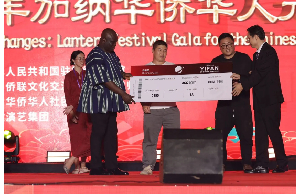The Local Governance Research Institute (LGRI) has called on Ghanaians to massively vote ‘Yes’ in next month’s referendum to allow for partisan politics at the local government level.
A referendum is scheduled to be held alongside the District Level Elections (DLE) on December 17, 2019, sparking public discussions on mainstream and social media whether or not Article 55 (3) of the constitution should be amended to give way for partisan politics during the elections of Metropolitan, Municipal and District Chief Executives as well as Assembly Members.
Despite a rigourous campaign by the opposition NDC for Ghanaians to kick against the move and vote ‘NO’, LGRI believes that for an effective and efficient local governance
architecture, Ghanaians who have attained the voting age should vote ‘Yes’.
In a statement signed by LGRI Executive Director, Wesley Owusu, the institute said standing elections on the ticket of a political party at the local level “provides an opportunity to curb the nuisance
of the “winner-takes-all” syndrome that has plagued our country” adding ”
the devastating effects of this canker will considerably ease to enhance our democracy.”
“…the argument that the divisive tendencies of partisan politics will be transferred to the local level is entirely speculative. While we admit that partisan politics have negative vibes sometimes, it equally comes with positive atmosphere which allows for growth that we need to harness for our development,” the statement explained.
LGRI said Ghana’s political climate
continues to be divisive because opposition parties feel left out after every election, and added that “partisan politics at the local level will bring about a ‘power-sharing’ structure that allows for minority parties to be a real part of the overall administration of the country.”
Below is LGRI’s statement;
FOR IMMEDIATE RELEASE
1. One of the contemporary issues on Ghana’s local governance and decentralization that has inundated our airwaves and received diverse opinions is the upcoming referendum on whether or not to introduce partisan politics in our local level elections.
2. As a local governance research and advocacy group, we wish to state our position and proffer input towards ensuring the most effective and efficient local governance architecture.
3. To begin with, there is no debating the fact that Ghanaians are ready and yearning for popular election of MMDCEs for the overall democratization of the local government space. Figures from the Afrobarometer Round 7, the report of the Constitution Review Commission in 2011 and report on an opinion survey conducted by the National Commission on Civic Education (NCCE) in August 2015 give credence to this statement.
4. The grey area within all of these discussions has to do with the referendum which is scheduled to be held alongside the District Level Elections (DLE) on December 17. We, at the Local Governance Research Institute (LGRI), are of a firm conviction that a YES vote for the introduction of partisanship at the local level is the way to go. Our decision is premised on the following:
5. First of all, going partisan at the local level provides an opportunity to curb the nuisance of the “winner-takes-all” syndrome that has plagued our country. The devastating effects of this canker will considerably ease to enhance our democracy. The argument that the divisive tendencies of partisan politics will be transferred to the local level is entirely speculative. While we admit that partisan politics have negative vibes sometimes, it equally comes with positive atmosphere which allows for growth that we need to harness for our development.
6. Our political landscape has witnessed innumerable chaotic and hostile acts usually from opposition parties with the diabolic and mischievous intensions of bad luck to the ruling government due to the winner-takes-all syndrome. Our political climate continues to be divisive because opposition parties feel left out after every election. LGRI believes that introducing party politics at the local level will reduce the struggles at the top and the wish and scheming of failure for a ruling government by opposition parties. The system of partisan politics at the local level will bring about a ‘power-sharing’ structure that allows for minority parties to be a real part of the overall administration of the country.
7. Political parties would be compelled to design and develop rigorous process of candidate selection which would attract highly qualified persons to represent the party at the local level. Additionally, a strong partisan Assembly would result in a commanding accountability system for the government.
8. Political parties are a strong force for citizen mobilization and sensitization. With a poor average voter turnout of about 35% in our DLEs, the involvement of political parties is imminent. Political parties have the wherewithal and the competence to fluff up the interest of their followers and sympathizers to come out in their numbers to vote. This will promote all-inclusive governance and enhance participatory democracy at the local level.
9. Over the years, our local government bodies have consistently suffered unwarranted deductions at source from their share of the District Assemblies Common Fund (DACF) by the ruling government. Unfortunately, the position and allegiance of the MMDCEs to the central government puts them in a position where they cannot demand what is duly and legally theirs to run the district. We believe that with opposition parties now in the picture, such practice will come to an end; but even if they do, these assemblies headed by opposition parties would use all administrative and legal means to ensure they get what is due the assembly.
10. Contrary to the constitutional provisions that stipulates that DLE elections should be non-partisan, the elections are obviously openly partisan with political parties endorsing candidates for District Assembly and Unit Committee elections. LGRI posits that, as a nation, we formalize and regulate the active participation of political parties in local elections.
11. At Local Governance Research Institute, we have resolved to support a campaign for YES vote in the upcoming referendum. The introduction of party politics will come to streamline the efficiencies in our local administrative system. We believe that civil society must support this campaign for a YES vote and show greater interest in the consequential constitutional and administrative amendments.
Signed
Dated: November 15, 2019
For further clarifications, contact Wesley Owusu, Executive Director or Nii Odartey Obetsebi-Lamptey, Director of Research on telephone numbers 0544759734 and 0247685104 respectively.
General News of Monday, 18 November 2019
Source: myxyzonline.com
Local Governance Research Inst. urges Ghanaians to vote ‘Yes’ in referendum
Entertainment












